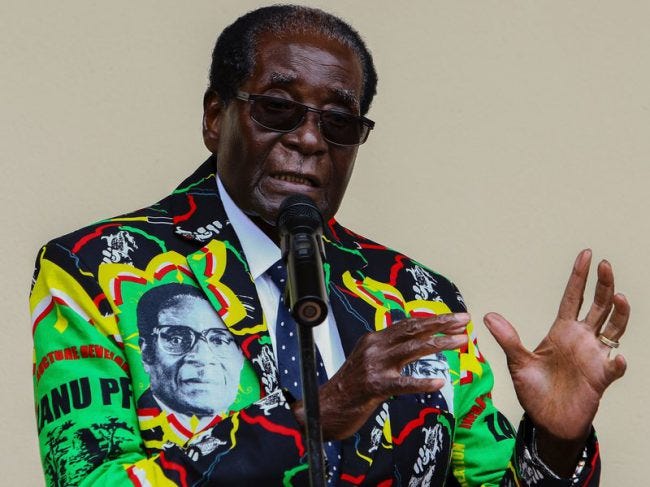The Disappearance Of Crimethink

In 2017, 74 of the 30,000 white farmers in South Africa were murdered.
In that same year, 48 unarmed Black men were killed by police in the USA, out of 21.5 million Black men, the majority of whom presumably go about unarmed most of the time.
That's one in 405 against one in 447,917. If you're upset by the latter --- and I don't think anybody likes it, with the possible exception of the people who benefit financially or politically from the situation --- you should be enraged by the former. Yet the uniparty media, which lionized Mr. Obama for his posthumous adoption of Trayvon Martin, became practically rabid with frothing fury when President Trump expressed concern regarding those South African farmers. CNN screeched that "one recently released accounting... suggested the killing of white farmers in South Africa was at a 20-year low." Well, the rate of "gun violence homicide" in the USA is half what it was in 1992 but that's not stopping our media from bleating about the "gun violence epidemic". Not one more death! Unless the guy is working a farm in South Africa, in which case 74 will be just fine!
We all know how this movie is going to end: the killings, beatings, rapes of intimidation of farmers will increase until they are driven off the land. The land will be given to cronies of the South African political leadership. Production will start to fall, because the qualities that make for a good political crony do not make for a good farmer. Over the course of say, a decade, South Africa will see its farming output decline until it is perhaps one-quarter or less of what it is now. Then South Africa will become a permanent recipient of Western aid and its people will live in abject poverty.
We know this because we've seen this movie before. The fall of Rhodesia from "Africa's breadbasket" to Africa's basketcase is well documented, even in left-leaning American press. Which no doubt explains why, as South Africa prepares to leap from the same precipice, the media is starting to rewrite history.
The Atlantic recently mourned Robert Mugabe's fall from power with a full suite of weasel words and phrases designed to obscure the fact that this single man turned a functioning country into a hellhole where people ate bugs:
Racist rule is a recent memory in the country, and Mugabe, despite his obvious faults, represented the successful fight against it.
As long as your definition of "successful" includes starving to death, but not before you are raped.
White-minority rule in southern Africa, which was so entrenched as to seem permanent before Mugabe took power, is now the stuff of history books, even if Africa and its people are still dealing with the economic and social consequences of its legacy.
Social consequences? I think that's fair; we are still dealing with the "social consequences" of slavery in the United States, the same way we are still dealing with the "social consequences" of the Irish potato famine or the "social consequences" of Henry VIII's ideas on religion. But "economic consequences"? For the vast majority of Africans, the personal impact of the 1880-1980 colonial period was a dramatically increased standard of living, improved access to health care, and greater personal security. (For an alternate viewpoint, this research paper suggests that Africa could have had its own Enlightenment and Industrial Revolution without European interference. To its credit, this paper avoids mentioning the pyramids.)
The "economic consequences" of Mugabe's rule are far less ambiguous. Not that they aren't acceptable, mind you. I would personally accept quite a bit of reduction in my standard of living to be solely governed by the Powell city council rather than by a distant and openly hostile cabal in Washington. I sympathize with black Africans who wanted freedom at any cost. But if you want freedom at any cost, it's intellectually despicable to pretend afterwards that there was, in fact, no cost. The Atlantic detailed those costs fifteen years ago in a factual article almost completely devoid of politically-correct sentiment:
Mugabe's belief that he can strengthen his flagging popularity by destroying a resented but economically vital minority group is one that dictators elsewhere have shared. Paranoid about their diminishing support, Stalin wiped out the wealthy kulak farming class, Idi Amin purged Uganda's Indian commercial class, and, of course, Hitler went after Jewish businesses even though Germany was already reeling from the Depression. Whatever spikes in popularity these moves generated, the economic damage was profound, and the dictators had to exert great effort to mask it.
The good news for putative dictators everywhere from South Africa to London is that the American media, which once fought and unmasked their efforts, will now assist them in the cover-up.
And if all others accepted the lie which the Party imposed – if all records told the same tale – then the lie passed into history and became truth. "Who controls the past," ran the Party slogan, "controls the future: who controls the present controls the past." And yet the past, though of its nature alterable, never had been altered. Whatever was true now was true from everlasting to everlasting. It was quite simple. All that was needed was an unending series of victories over your own memory.
You can start by forgetting Rhodesia. It never existed. There was never enough food in Zimbabwe, there was always a corrupt and crony-infested government. It is the natural order of things. Winston, how many fingers am I holding up?

